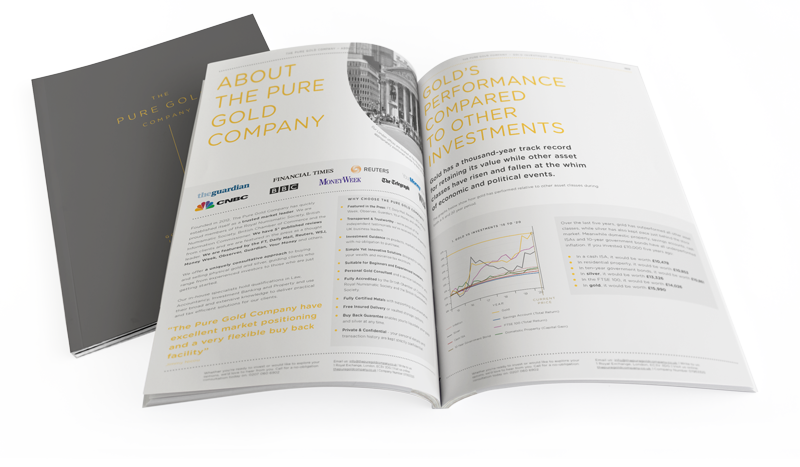It’s never too late to start saving for your retirement (although sooner is always better). If you’re doing it yourself through a Self Invested Personal Pension (SIPP) you would do well to consider including an allocation of physical gold to add diversity to your portfolio. Physical gold can help to reduce overall risk, can hedge against inflation, reduces counterparty risk, and comes with lucrative tax advantages. As investors approach retirement age, many financial advisers take action to swing the balance of assets in a pension portfolio towards the less volatile or risky end of the scale, but gold is a smart consideration at every stage of your pension journey.
So why should you consider investing in physical gold within your pension pot, and what is the process?
Why gold?
One of the key characteristics of a good pension is diversity. As a long-term asset that is designed to increase over time, spreading risk is essential. Most corporate pensions consist of a selection of stocks, bonds and cash, matching the pension liabilities (expected pension payouts to pensioners) with their assets (how risky they are and whether they can be sold in time to fund the payouts). Some large pension funds more recently have started to include alternative assets like property, infrastructure and commodities in their portfolio.
Why should gold be one part of your pension investment?
If you have a Self Invested Personal Pension (SIPP) or SSAS, it is just as important to embrace the diversification principle that is the mantra of larger pension funds. This diversification principle works very well with gold because the yellow metal often moves inversely to stock markets or currencies. This means it can act as a balancing asset when other investments are underperforming, potentially reducing overall portfolio risk.
This effect is the result of gold being a safe-haven asset. As a long-term store of wealth, investors often turn to gold during periods of economic uncertainty and geopolitical tension. This flight to safety causes the gold price to increase in response to global events when other assets are often falling. It can be clearly seen during the global financial crisis in 2008-2011 and the pandemic in 2020, both of which led to record gold prices.
Physical Gold And Pensions
Discover the benefits of investing in physical gold through your SIPP with our handy guide.

Another key advantage of gold is that it often acts a hedge against inflation. Rising prices can have a negative effect on true pension values because you can buy less for the same amount of money. Many pension funds aim to manage this risk by targeting a larger growth than inflation, but when inflation surges into double digits like it did in 2021-2023 it is rarely possible for investments to keep up. The end result is a pension pot able to buy less than it did before inflation spiked.
As a commodity and a store of long-term value, gold usually rises in price alongside other goods. This creates a natural inflation hedge, allowing the value of the yellow metal to keep up with growing prices. It’s not a perfect relationship as there are many factors that affect the gold price, but over hundreds of years, gold has maintained its buying power as the value of cash has eroded. In 1920 an ounce of gold cost around £4.60. Holding onto that cash would only buy you a sandwich today, but that ounce of gold is now worth over £1,850.
It’s true you can hold ‘electronic’ gold in your pension fund through exchange traded funds and other stock investments that are exposed to gold miners. However, these investments are exposed to counterparty risk if the institution goes bust. Counterparty risk is present in almost all financial transactions, and holding physical gold in your pension minimises this risk.
How to Invest in gold in your pension

In 2006, the UK government allowed physical gold to be held in Self Invested Personal Pensions (SIPPs). The gold must be in the form of bars and a minimum purity of 995 out of 1000 (99.5% pure). The normal tax advantages of saving through a pension are that the government will provide tax relief between 20% and 45% depending on your tax rate.
The increase in the value of your gold over time is also accumulated free of capital gains tax, which in some instances can be as high as 28%. Not all SIPPs are enabled to hold gold so it’s worth checking which ones do ahead of any decision.
Finding a SIPP that allows gold investment
Only some Self Invested Personal Pension (SIPP)’s enable you to invest in gold within them. So this is the first step in the process of adding the yellow metal to your portfolio. Your own SIPP may allow or even consider permitting physical gold as an investment .You will have to contact them to find out. A specialist gold broker, such as The Pure Gold Company, will have a list of suitable SIPP providers.
Book a free consultation
We offer free 15 min, 30 min and 1 hour consultations so you can ask as many questions as you like without feeling rushed.
Our expert brokers love to chat about all things Gold and Silver.

Once you’ve a suitable SIPP provider, make sure you take professional financial advice before instructing them of your intentions to invest in physical gold.
Gold dealers cannot offer specific financial advice but a reputable dealer will be able to furnish you with procedural guidance. They can also help with facts about gold, its performance, what gold products are available. They can also advise on the timings of your gold purchase. Consider reputation, accessibility and security. Do some research and ensure they can provide you with the right level of information you need. Can they explain the types of gold available so you can make an informed choice about what to invest in? Will they store it on a segregated and allocated basis instead of pooled storage? And importantly – will they offer a Buy Back Guarantee? It’s important that your pension scheme is able to liquidate your gold quickly and easily. A guarantee from your gold dealer to buy back any physical gold purchased from them means this is covered already.
Transfer funds from existing pension to SIPP
Once your new SIPP is set up, and funds transferred, you would typically just complete a form (an instruction to purchase). This permits the SIPP provider to purchase a certain amount of physical gold bars. Funds are then transferred to your gold brokerage and you confirm the exact sizes and denominations of gold bars that you wish to purchase. It’s critical for quality, legitimacy and future resale that any bars that are purchased are from LBMA member providers. Once the allocation is complete – you are sent your paperwork (Transaction Invoice, Storage Agreement, Certificate of Authenticity), which would be in the name of your pension scheme..
Diversifying your pension assets is nearly always a prudent move. For a comfortable retirement, holding safe-haven assets like gold are a sensible way to help protect your future from volatility and risk.
Looking Into Gold Investment?
Book a FREE consultation with our expert brokers at The Pure Gold Company.

Is gold a good UK pension investment?
Gold can be a strong option for UK pension investment due to its ability to act as a hedge against inflation and economic instability. Unlike stocks or bonds, gold typically retains value even in times of financial uncertainty, offering a safeguard for retirement funds. Investing in gold through a Self-Invested Personal Pension (SIPP) allows UK pension holders to diversify their portfolios with a tangible asset that performs independently of traditional markets. While gold doesn’t generate income, its safe-haven status provides long-term security for cautious investors focused on wealth preservation.


